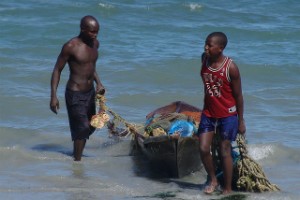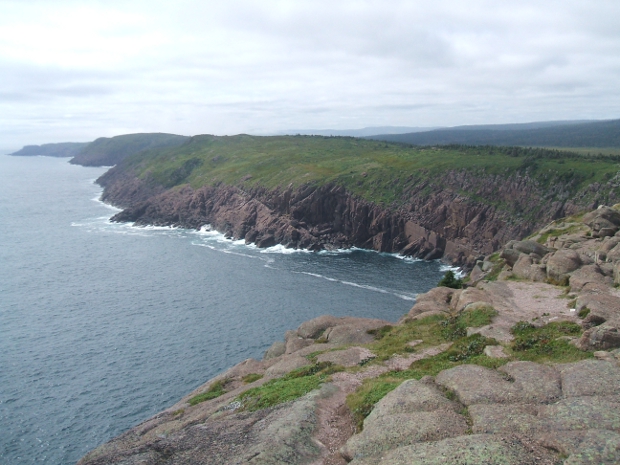Introduction
Interdisciplinary methods to build a socio-ecological decision-making tool to inform marine governance and policy

Human wellbeing is closely linked to the health of environments we live in and depend upon for our food, water and jobs.
It is now widely recognised that sustainable management, that supports both people and the environments on which we depend, can only be achieved through balancing economic, ecological and social goals.
Slow progress towards achieving sustainability goals has been compounded by a lack of communication between academics and decision-makers. In addition, policymakers currently lack tools to combine diverse data from different disciplines.
From the start, an important part of this project was to create a participatory forum that motivated scientists and policy advisors working in the marine environment to exchange knowledge. This was so that a more practical and user-friendly management tool can be developed in the longer term.
Management tool
 The project built the foundation for a management tool to assist decision makers in visualising how different management measures (for example, introducing a Marine Protected Area to address overfishing) can impact the ability of a fishing community to adjust to changes that influence income-generating activities.
The project built the foundation for a management tool to assist decision makers in visualising how different management measures (for example, introducing a Marine Protected Area to address overfishing) can impact the ability of a fishing community to adjust to changes that influence income-generating activities.
In our study we brought together natural and social scientists using an interdisciplinary approach to apply their expert knowledge with empirical data collected from communities interviewed in the Western Indian Ocean.
This region of the world provides an important case study because it is home to many communities that are socially and economically dependent on reef fisheries. This makes them vulnerable to damage from climate change, as rises in sea temperature lead to bleaching of corals, the home for many fish.
Links to Aims, Outputs, The Team
 Aims
Aims
- To support marine governance and policy by developing reproducible methods for valuing and integrating data from social science, economics and natural science into a dynamic decision-making model based on Bayesian principles to inform marine policy formation.
- Specifically to assess the viability of Bayesian Belief Network models as a mechanism to achieve this aim (context: WIO marine community).
Outputs
The project team has researched and developed the process to underpin improved policy making which considers environmental management from the three key pillars of sustainability: 1) economic drivers, 2) social considerations and 3) ecological indicators of environmental health.
An exciting result from this project is the establishment of a new marine network that facilitates co-operation between both academics and policy advisers. This is considered a key attribute towards building good marine governance and a more participatory approach in policy making.
Whilst this particular Bayesian Belief Network was developed in the context of a fishing community in the West Indian Ocean, the members of our network from the marine policy and management community in the UK (Marine Management Organisation, Marine Scotland and Defra) indicated strongly that such an approach would be directly transferrable to a UK context.
We also believe that it has the potential to be adapted for use by conservation groups or non-governmental organisations with an interest in the sustainable management of marine resources.
Research papers
The main outputs from the project are three research papers:
- Bayesian Belief Networks as an Interdisciplinary Marine Governance and Policy Tool
- Synthesis of household non-market values for the ecosystem services from a marine resource
- Using a Bayesian Belief Network to Integrate Ecology, Economics and Social Sciences to Improve Policy Making: a Literature Review
Critical Reflection
The group held a discussion on the process of working across disciplines.
Here are some of the ideas and suggestions from the critical reflection:
a) More Time Assigned at Beginning of the Project
- Set aside time at the beginning of the project to allow individuals to learn and understand the different languages and methods of thinking. This will help build trust between the disciplinary approaches and foundation of understanding.
b) Other areas for improvement to consider during the early stages of the project
- Time to allow individuals to have their input in the research agenda.
- A meeting/discussion on the processes and methods that could be used.
- Think about and discuss the authorship and outputs earlier.
c) External Moderation & Reflection
- Reflection & external moderation to observe the process analysis from a meta level and to ensure the project/team are functioning as intended.
- This should be implemented throughout the project to assist the teams’ integration and to recognise areas of development.
d) Employ a Project Manager
- A salaried project manager would have allowed coordination; someone who draws everything together and identifies problems that are arising, as well as dealing with finance.
- This manager could be independent to study and it was recommended that they don’t have knowledge in any of the disciplines.
e) Meetings and Attendance
- There should be at least 2 specialists and an integrator in each discipline to take part in the project.
- If there is an discipline absent from a meeting and a decision or important point has been raised, then an extra communication channel to disseminate more widely the outcomes of its meetings to enhance the transparency of the process and fluidity and continuity of the research.
- This would allow the absent individuals to be more in touch with the decisions and progress made in between meetings.
- Where possible at least one representative per discipline to represent views at group meetings where important decisions are made and to ensure fair and equal participation of all individuals.
And some final thoughts for the future:
The project will need more input or collection of “real data” pertaining to the system being studied from all involved disciplines, and it will need community consultation during model making if possible.
We tried by mixing the groups when discussing conceptual models but we never got people to put on a different 'hat'.
The team
Project Leader
Professor Susan Chilton - Newcastle University
Project Mentors
Co-Investigators:
Professor Selina Stead - Newcastle University
Dr. Hugh Metcalf - Newcastle University
Professor George Hutchinson - Queens University Belfast
Professor Steve Rushton - Newcastle University
Prof. Yunus Daud Mgaya - University of Dar es Salaam
Ms Maggie Roe - Newcastle University
Dr Paola Gazzola - Newcastle University
Dr. Shepley Orr - University College London
Dr Aileen Mill - Newcastle University
Dr Clare Fitzsimmons - Newcastle University
Dr Matt Slater - Newcastle University
Dr Christopher J. Sweeting - Newcastle University
Dr Danny Campbell - Queens University Belfast
Professor Susan G.Clark - Yale University
